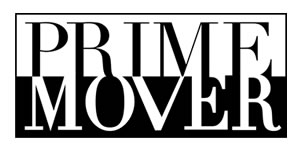
Roger Fisher House; the Mercy Corps Office Between Harvard Square and Harvard Law School. © Paul Cramer 2005.
Firm Origins
The relationship among the partners of PrimeMovers and The Harvard Negotiation Project, the Program on Negotiation and founders William Ury and the late Roger Fisher and Howard Raiffa.
One-Text Process and the Camp David Accord
A story about the Camp David Accord that illustrates the One-Text mediation tool developed by The Harvard Negotiation Project and used extensively by PrimeMovers.
Our Mentors: Roger Fisher, Howard Raiffa and William Ury
Brief descriptions, photographs and links.
Firm Origins
PrimeMovers delivers all of its services and products using an approach based on its origins in the Harvard Negotiation Project and The Program on Negotiation and with their co-founders Dr. William L. Ury and the late Prof. Roger Fisher and Prof. Howard Raiffia. The mission of the Harvard Negotiation Project is to improve the theory, teaching, and practice of negotiation and dispute resolution so that people can deal more constructively with conflicts ranging from the interpersonal to the international. Founded in 1979, the Project was the first interdisciplinary research center on negotiation in the world. Since 1980, partners of PrimeMovers and its predecessor firms, CMI Concord Group (“CMI”) and Conflict Management Group (“CMG”, now a part of Mercy Corps) worked with Roger Fisher, Howard Raffia, and Bill Ury variously as teaching staff at the Harvard Negotiation Project and as business partners of CMI and CMG. We collaborated on projects ranging from peace making in South Africa and the Middle East to the creation of multimedia teaching materials on negotiation such as Getting To Yes, The Video and Yes, The Interactive Negotiator. With our colleagues, PrimeMover professionals have mediated disputes, created products, contributed to books, advised diplomats, and taught negotiation to thousands of leaders in business, government, religion, labor, education, and diplomacy.
One-Text Process and the Camp David Accord
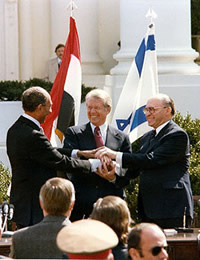
President Carter, Prime Minister Begin, and President Sadat Celebrate the Camp David Accord
A dramatically successful example of one of the Harvard Negotiation Project’s techniques used regularly by PrimeMovers –the “One-Text” process–occurred during the Camp David Accord negotiation. On September 17, 1978, Prime Minister Begin and President Sadat, with the facilitation of President Carter, concluded the historic agreement that has brought over a quarter century of peace between Israel and Egypt.
Prof. Fisher’s initial involvement in the Middle East peace process began many years earlier in a visit to President Sadat’s predecessor, Gamal Abdel Nasser. In an interview with President Nasser, Fisher explored the long list of demands Egypt had made of then Israeli Prime Minister Golda Meier. He then asked President Nasser what would happen to Prime Minister Meier if she said “Yes” to them all. Fisher reports that President Nasser laughed and said “Boy oh boy, would she have a problem!” Then President Nasser became more thoughtful upon recognizing the barrier to agreement that his own demands had created. It was one of the first steps in getting the parties to understand that success would only come about by crafting a choice to which the other side could say “yes.”
On Martha’s Vineyard, years later and two weeks before Sadat and Begin met at Camp David, Fisher met with his neighbor and tennis partner U.S. Secretary of State Cyrus Vance. They talked about the upcoming negotiation. Fisher described in detail a “one-text” process for managing complex negotiations. This process allows a neutral mediator to create a working “draft” that the parties criticize and improve, without making commitments. The goal of the process, Fisher explained, is to keep the parties from locking into rigid positions from which they would not back down and which would ultimately stalemate the mediation. The mediator controls and continuously improves the draft until he or she believes it satisfies the parties’ interests as well as possible. Then and only then are the parties asked to commit. The process also minimizes the back-and-forth “haggling” that often plagues mediations.
Despite personal enmity that kept Begin and Sadat in separate Camp David quarters throughout the negotiation, President Carter and Secretary Vance used the one-text process, along with their many other resources and personal qualities, to produce the Camp David Accord. Although neither Prof. Fisher nor the partners of PrimeMovers were present for this negotiation, it illustrates the motivation and skill of those involved in PrimeMovers’ heritage, the power of good process, and one of the many effective methods by which PrimeMovers serves its clients.
Our Mentors: Roger Fisher, Howard Raiffa, and William Ury
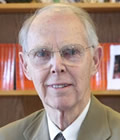
Roger Fisher, Samuel Williston Professor of Law Emeritus at Harvard Law School, was the founder of the Harvard Negotiation Project, co-founder of CMI and CMG, and co-author of Getting To Yes, Getting Together, and Beyond Reason and many other seminal books on negotiation. He passed away in August, 2012, at the age of 90.
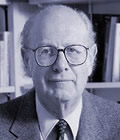 Howard Raffia was Frank P. Ramsey Professor of Managerial Economics Emeritus, a joint chair held by the Business School and the Kennedy School of Government at Harvard University. Professor Raiffa was the author of The Art and Science of Negotiation, and co-author of Negotiation Analysis, Smart Choices and many other books on negotiation, decision-making, and game theory. Prof. Raiffa passed away in July 2016 at the age of 92. For more information on Professor Raiffa, please see this biographical summary.
Howard Raffia was Frank P. Ramsey Professor of Managerial Economics Emeritus, a joint chair held by the Business School and the Kennedy School of Government at Harvard University. Professor Raiffa was the author of The Art and Science of Negotiation, and co-author of Negotiation Analysis, Smart Choices and many other books on negotiation, decision-making, and game theory. Prof. Raiffa passed away in July 2016 at the age of 92. For more information on Professor Raiffa, please see this biographical summary.
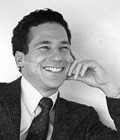 Bill Ury, Director of the Global Negotiation Project, is the cofounder of the Program on Negotiation, coauthor with Roger Fisher of Getting to Yes, coauthor with Jeanne Brett and Stephen Goldberg of Getting Disputes Resolved (Winner of the 1985 CPR Award for Excellence in ADR) and author of Getting Past No, The Third Side, and many other books and articles on negotiation and peace making. For more information on Dr. Ury, please see his website, WilliamUry.com.
Bill Ury, Director of the Global Negotiation Project, is the cofounder of the Program on Negotiation, coauthor with Roger Fisher of Getting to Yes, coauthor with Jeanne Brett and Stephen Goldberg of Getting Disputes Resolved (Winner of the 1985 CPR Award for Excellence in ADR) and author of Getting Past No, The Third Side, and many other books and articles on negotiation and peace making. For more information on Dr. Ury, please see his website, WilliamUry.com.
